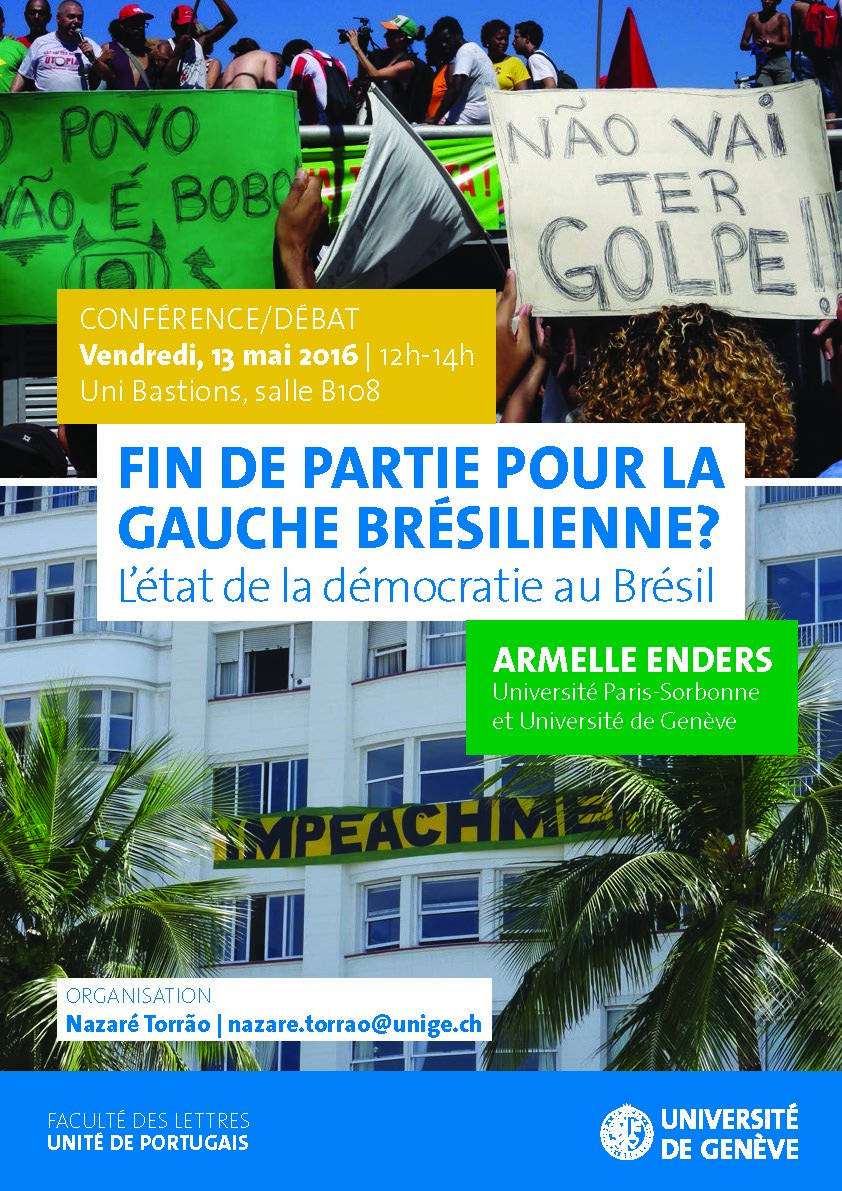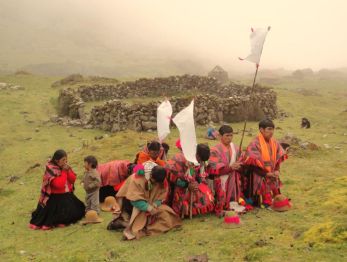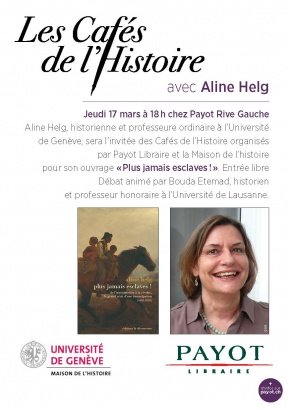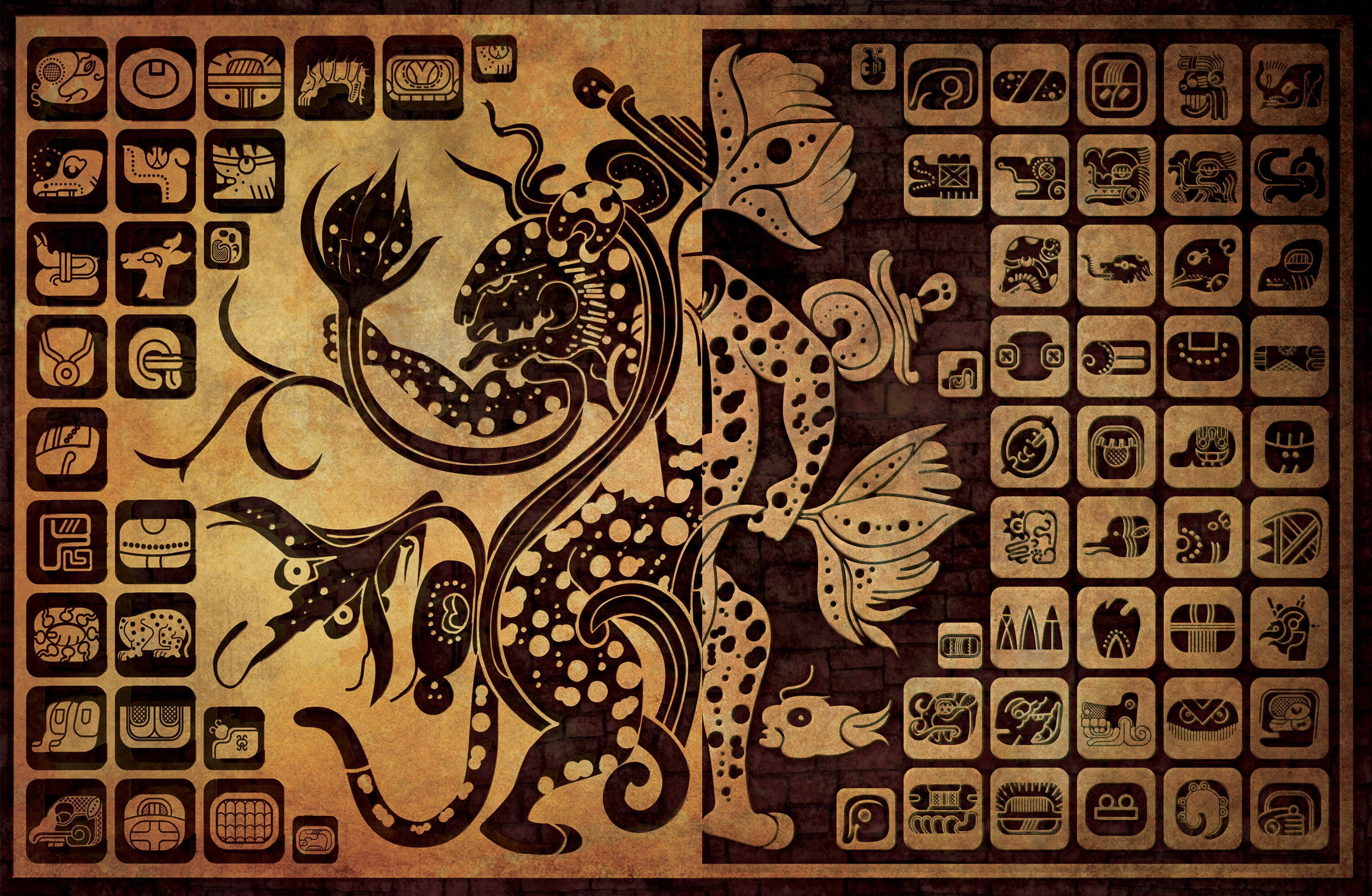Conferences
Simposio: Falsificaciones en las Artes, las Letras y los Productos
- Veröffentlicht: Montag, 23. Mai 2016 23:01
Tenemos el placer de anunciarles el simposio interdisciplinario sobre las falsificaciones en las artes, las letras y los productos.
FECHA: 17 y 18 de junio 2016.
Lugar: Universidad de San Gallen, sala 09-012, edificio de la Biblioteca Entrada superior, frente a Guisanstrasse 11, entrada principal, Dufourstrasse 50.
Nos encantaría contar con su presencia en el evento, cuyo programa encuentran en documento adjunto.
La jornada está abierta al público y será de asistencia gratuita. Por motivos de organización, les rogamos que se inscriban hasta el 15 de junio de 2016: Diese E-Mail-Adresse ist vor Spambots geschützt! Zur Anzeige muss JavaScript eingeschaltet sein!
ORGANIZA:
Centro Latinoamericano-Suizo CLS-HSG, San Gallen
Tfno.: +41 071 224 25 66 Diese E-Mail-Adresse ist vor Spambots geschützt! Zur Anzeige muss JavaScript eingeschaltet sein!
www.cls.unisg.ch
INTRODUCCIÓN
En las culturas occidentales, la autenticidad y la originalidad suelen considerarse valores autosuficientes, estrechamente ligados entre sí que pueden provocar dilemas y situaciones límite. Al mismo tiempo, la falsificación goza de un reconocimiento renovado: el mimetismo en la naturaleza, Jusep Torres Campalans en el género biográfico, Pierre Menard en la escritura, Elmyr de Hory en la pintura o el pirateado bolso Louis Vuitton siguen suscitando un amplio interés. Las letras, las artes y los productos industriales recurren a la falsificación como principio creador tan sugerente como subversivo. Al mismo tiempo, no se deja de reivindicar la importancia de la propiedad intelectual y el valor de lo auténtico. La era digital, por su parte, trae consigo nuevos desafíos que no solo atañen a las prácticas de patentar productos sino también la piratería y el plagio de trabajos académicos. Tematizar este debate promete llevarnos hacia una exploración dialéctica de sus tensiones. El congreso aborda la falsificación como zona crepuscular entre recurso artístico y práctica ilícita que saca a la luz nuevas dimensiones del siempre problemático vínculo entre la verdad y su ocultamiento.
- Kategorie: Conferences
CONFERENCE/DEBAT FIN DE PARTIE POUR LA GAUCHE BRESILIENNE?
- Veröffentlicht: Donnerstag, 28. April 2016 14:16
 VENDREDI, 13 MAI 2016 12h-14 h
VENDREDI, 13 MAI 2016 12h-14 h
UNI BASTIONS, SALLE B108
FIN DE PARTIE POUR LA GAUCHE BRESILIENNE?
L'ETAT DE LA DEMOCRATIE AU BRESIL
Par Armelle Enders
Université Paris-Sorbonne et Université de Genève
Contact:
FACULTE DES LETTRES
UNITE DE PORTUGAIS
Nazaré Torrão : Diese E-Mail-Adresse ist vor Spambots geschützt! Zur Anzeige muss JavaScript eingeschaltet sein!
- Kategorie: Conferences
Conference "CHANGEMENT CLIMATIQUE ET EXTRACTION MINIÈRE CHEZ LES Q’EROS DES ANDES"
- Veröffentlicht: Donnerstag, 24. März 2016 13:56
Dans le cadre du séminaire “Comprendre le monde andin (Pérou, Bolivie, Equateur). Politique, société et ethnicité, XIX-XXème siècles » organisé par Ombeline Dagicour.

LE DR. GEREMIA COMETTI
(Fondation Nationale Suisse, chercheur invité au Laboratoire d’Anthropologie Sociale- EHESS/Collège de France (Paris). Auteur de Lorsque le brouillard a cessé de nous écouter » Changement climatique et migrations chez les Q’eros des Andes péruviennes. Bern, Berlin, Bruxelles, Frankfurt am Main, New York, Oxford, Wien: Peter Lang, publié en 2015).
Donnera la conférence :
CHANGEMENT CLIMATIQUE ET EXTRACTION MINIÈRE CHEZ LES Q’EROS DES ANDES
RÉSUMÉ: À travers un travail ethnographique chez les Q’eros des Andes péruviennes, cette communication vise à montrer l’importance d’intégrer dans les études conventionnelles sur les impacts du changement climatique, les points de vue des sociétés directement concernées. Ces réflexions seront élargies en intégrant dans l’analyse la question du secteur extractif – toujours plus expansif – au Pérou et dans la région de Cuzco. L’objectif principal de la communication sera de repenser les relations entre êtres humains et non humains afin de mieux comprendre comment les sociétés andines conçoivent et réagissent face aux mutations rapides de leur environnement.
Lieu/date : SALLE MR040, UNIMAIL, PLACE DE PLANPALAIS, GENEVE - Lundi 4 AVRIL, DE 16H15 A 18H00
- Kategorie: Conferences
Présentation du livre "Plus jamais esclaves"
- Veröffentlicht: Freitag, 11. März 2016 18:06
 Les Cafés de l'Histoire
Les Cafés de l'Histoire
Payot Librairie et la Maison de l'histoire vous convient aux Cafés de l'Histoire :
Avec Aline Helg (UNIGE) pour son ouvrage "Plus jamais esclaves".
Débat animé par Bouda Etemad (UNIL).
Jeudi 17 mars 2016 | 18h00 | Payot Rive Gauche
- Kategorie: Conferences
LECTURE: DIE MAYA IM DIGITALEN ZEITALTER - THE MAYA IN THE DIGITAL AGE
- Veröffentlicht: Sonntag, 21. Februar 2016 09:39
VORTRAG - ETHNOLOGIE FASSBAR
MUSEUM DER KULTUREN BASEL

DIE MAYA IM DIGITALEN ZEITALTER
THE MAYA IN THE DIGITAL AGE
02. März 2016, 18.00 - 20.00 Uhr
March 2, 2016, 06.00 - 08.00 p.m.
Museum der Kulturen Basel, Münsterplatz 20, 4051 Basel
Die hölzernen Türsturze aus Tikal gehören zu den wichtigsten Kunstwerken der vorspanischen Maya. Wir diskutieren über den neusten Stand zur Forschung ihrer Hieroglyphentexte und Bildwerke und stellen ein neues digitales Dokumentationsprojekt zur Analyse der bekannten klassischen Maya-Texte vor, das zur Herstellung eines digitalen Wörterbuchs führen wird.
Mit Christian Prager, Sven Gronemeyer und Elisabeth Wagner, Forschungsprojekt „Textdatenbank und Wörterbuch des Klassischen Maya“, Universität Bonn. Moderation: Alexander Brust.
Eintritt (gemäss Tarifstruktur)
The wooden lintels from Tikal are amongst the most significant works of art created by the pre-Hispanic Maya people. We discuss the newest research findings concerning the hieroglyph texts and accompanying imagery and present a new digital documentation project designed to analyse the classical Mayan texts with the aim of compiling a digital dictionary.
With Christian Prager, Sven Gronemeyer and Elisabeth Wagner, research project “Text Data Base and Dictionary of Classical Maya”, University of Bonn. Panellist: Alexander Brust
> in german
Link zur Veranstaltungsreihe "Ethnologie fassbar"
Museum der Kulturen Basel | Münsterplatz 20 | 4051 Basel | T +41 61 266 56 00 | Diese E-Mail-Adresse ist vor Spambots geschützt! Zur Anzeige muss JavaScript eingeschaltet sein!
GRASPING ANTHROPOLOGY
Every first Wednesday of the month, in the evening, we organize an interactive event called “Grasping Anthropology”. The idea is to present an anthropological topic of interest, discuss current societal issues and tell stories from a fresh or at least different perspective, offering new and often surprising ways of looking at our everyday life.
The speed of political and socio-cultural change has stepped up a gear over the last few years – whether this is actually the case or only felt so is anyone’s guess. The term “unbelievable” is on everyone’s lips, signalling individual as well as collective astonishment, maybe even the feeling of losing control. Triggering mixed feelings, even anxiety, lies in the nature of change. The event “Grasping Anthropology” is a special form of mediation and outreach. In guided tours, gallery talks, discussions, workshops, concerts, readings, etc. we shed light on a wide range of culturally and socially relevant topics – in context and in a coherent and comprehensible way. Engagement with the audience and lively discussions on current issues, exhibitions, exhibited objects or the museum as such is what our curators and guest speakers expect, or at least hope for. In this way both sides profit from the exchange, making things which at first appear unbelievable, easier to grasp.
- Kategorie: Conferences
Conference and Roundtable: Extractive Industries and Local Governance in Developing Countries: Challenges and Solutions
- Veröffentlicht: Freitag, 12. Februar 2016 01:21
Conference and Roundtable
Extractive Industries and Local Governance in Developing Countries: Challenges and Solutions
18 January 2016, 14:00-‐19:30
Auditorium Jacques-‐Freymond, Parc Barton
Graduate Institute of International and Development Studies (IHEID), Geneva
Extractive industries play an important role in resource-‐rich developing countries. Natural resource extraction makes significant contribution to GDP and government revenue in such countries. However, there are many risks associated with resource dependence including commodity price volatility, lack of transparency and corruption, environmental degradation, displacement of communities and labour rights violations, which can outweigh the economic benefits. Focusing on Africa, Asia and Latin America, this conference explores how effective local governance strategies have been used in specific contexts to overcome such challenges and enable natural wealth to improve people’s lives.
Key questions to be addressed include:
-‐ What policy measures can be used to strengthen the local governance of extractive industries?
-‐ What can be done to reduce the risk of extractive industries causing enclave economies?
-‐ What measures can be taken to minimize negative social and environmental impacts and promote inclusive and sustainable development?
The conference is organised by the Swiss Society of Americanists, in partnership with the journal International Development Policy the Executive Master in Development Policies and Practices (IHEID), and the Centro Estudios y Promocion del Desarollo – desco (Peru), with the support of the Swiss Academy of Humanities and Social Sciences.
Further information:
Liliana Soler
Regional Academic Coordinator for Latin America
Executive Master in Development Policies and Practices (DPP)
Diese E-Mail-Adresse ist vor Spambots geschützt! Zur Anzeige muss JavaScript eingeschaltet sein!
- Kategorie: Conferences
Cierre Convocatoria Ponencias para participar en los simposios CEISAL 2016
- Veröffentlicht: Samstag, 03. Oktober 2015 08:07
Cierre Convocatoria Ponencias para participar en los simposios: el 30 de octubre de 2015
Convocatoria | España - Instituto de Iberoamérica de la Universidad de Salamanca CEISAL 2016
 El próximo congreso del Consejo Europeo de Investigaciones Sociales sobre América Latina (CEISAL) tiene lugar en Salamanca en 2016. Está organizado por el Instituto de Iberoamérica de la Universidad de Salamanca. Los ejes temáticos entorno a los que gira este encuentro internacional son: Antropología Social - Economía Aplicada - Ciencia Política - Creación, arte, imagen: aperturas del campo cultural – Comunicación – Demografía –Derecho - Estudios de Género – Historia –Literatura – Sociología - Trabajo Social y Servicios – Sociales - Traducción y Documentación - Relaciones Internacionales.
El próximo congreso del Consejo Europeo de Investigaciones Sociales sobre América Latina (CEISAL) tiene lugar en Salamanca en 2016. Está organizado por el Instituto de Iberoamérica de la Universidad de Salamanca. Los ejes temáticos entorno a los que gira este encuentro internacional son: Antropología Social - Economía Aplicada - Ciencia Política - Creación, arte, imagen: aperturas del campo cultural – Comunicación – Demografía –Derecho - Estudios de Género – Historia –Literatura – Sociología - Trabajo Social y Servicios – Sociales - Traducción y Documentación - Relaciones Internacionales.
El Consejo Europeo de Investigaciones Sociales de América Latina [CEISAL] y el Instituto de Iberoamérica de la Universidad de Salamanca te invitan a presentar propuestas de Simposios para participar en el 8ºCongreso Internacional bajo el lema “Tiempos posthegemónicos: sociedad, cultura y política en América Latina”, que se realizará en Salamanca, España, los días 28, 29 y 30 de junio y 1 de julio de 2016.
CEISAL es una red que agrupa a los principales institutos, centros especializados en estudios de América Latina y asociaciones nacionales de investigación social sobre América Latina de Europa, y que cuenta, actualmente, con cincuenta y uno miembros que representan a 19 países europeos. La idea es generar espacios de reflexión plurales y críticos desde las diferentes disciplinas de las Ciencias Sociales para avanzar en el conocimiento de la realidad social, cultural, económica y política de América Latina en tiempos posthegemónicos.
Se puede leer todos los detalles de esta cita en Salamanca en el sitio web del evento: http://ceisal2016.usal.es/es/
- Kategorie: Conferences
ANUNCIAN RECEPCION DE CANDIDATURAS PARA 56 ICA 2018
- Veröffentlicht: Samstag, 03. Oktober 2015 07:27
COMITÉ PERMANENTE DEL CONGRESO INTERNACIONAL DE AMERICANISTAS
Candidaturas para 56 ICA 2018
Además de conocer los “Estatutos del Congreso Internacional de Americanistas”, quienes deseen presentar en la Asamblea General (art. 04) una candidatura a nueva Sede ICA deberán entregar en la Secretaría General del Comité Permanente del Congreso Internacional de Americanistas (CP.ICA), a más tardar tres días antes de la Asamblea, la siguiente documentación:
1.- La nómina de los profesionales académicos que serán los responsables directos de la organización del próximo Congreso, como posibles miembros del “Comité de Organización” (arts. 04 y 05). Es recomendable añadir un breve “curriculum vitae”, que incluya referencias a su experiencia y previa participación en eventos semejantes, particularmente en anteriores Congresos Internacionales de Americanistas.
2.- Una propuesta institucional del Rector o Presidente de la Universidad posible sede del Congreso, o de una institución académica de igual categoría, en la que claramente aparezca el compromiso legal o jurídico de la institución (no solo de la persona) en la organización del mismo. La propuesta deberá incluir una referencia a la idoneidad de la planta física de la Universidad o institución posible sede y de sus posibilidades académicas y tecnológicas.
3.- Un plan explicativo que aclare cómo ha sido ideado el Congreso, cuáles serían sus actividades académicas, la infraestructura posible de ser utilizada (número de aulas, auditorios, sistemas y redes de informática, aparatos audiovisuales, etc.); cálculo aproximado de asistentes, valores de inscripción, ayudas con becas, etc.
4.- Un cronograma de las actividades de preparación (a lo largo de casi tres años), que tenga en cuenta la organización, ya tradicional y por razones de los calendarios académicos universitarios, de los Congresos de Americanistas en el verano boreal. A este propósito cabe recordar que los Congresos Internacionales de Americanistas, desde su inicio en 1875, han tenido por objeto “el estudio histórico y científico de las Américas y sus habitantes” (art. 01), por lo que los organizadores deben establecer nexos con científicos e instituciones académicas de todo el Continente.
5.- Cartas oficiales de apoyo de entidades gubernativas y empresariales, universidades e instituciones científicas, fundaciones, etc., que efectivamente deseen apoyar, inclusive con ayuda financiera, la organización de algún evento cultural o la promoción de otro tipo de eventos dentro del Congreso.
6.- Es aconsejable explicar, con datos reales, la capacidad hotelera que ofrece la ciudad sede, sus comunicaciones aéreas, terrestres o de otra índole, y las posibles ofertas turísticas o de índole cultural.
El Congreso Internacional de Americanistas se llevó a cabo por primera ocasión en Nancy, Francia, del 18 de junio al 18 de julio de 1875, mediante la iniciativa de la Société Américaine de France la cual emitió su convocatoria el 25 de agosto de 1874.1 Desde entonces, se han celebrado más de cincuenta reuniones durante más de 125 años.
El objetivo del Congreso Internacional de Americanistas es el estudio histórico y científico de América desde una perspectiva multidiciplinaria. Las áreas temáticas pueden llegar a variar, pero generalmente se centra en los temas de:2
- Arqueología
- Antropología: social, cultural, etnología, física y bioantropología
- Lingüística y literatura
- Historia y Arte: etnohistoria, historia de la ciencia, historia del arte e iconografía
- Movimientos étnico-sociales y Derechos humanos
- Estudios económicos, sociales y político-jurídicos
- Pensamiento, filosofía y educación
- Globalización, patrimonio y políticas públicas
- Ciencias, tecnología y medio ambiente
Para mas informacion: http://www.ica55.ufg.edu.sv/
- Kategorie: Conferences
Coloquio: Gobernanza local, pueblos indígenas e industrias extractivas en América Latina: transformaciones y continuidades
- Veröffentlicht: Donnerstag, 25. Juni 2015 15:12
Coloquio: Gobernanza local, pueblos indígenas e industrias extractivas en América Latina: transformaciones y
continuidades
Lima, 10 y 11 de agosto de 2015
PRESENTACIÓN
El evento busca intercambiar experiencias sobre lo impactos, resistencias y alternativas al extractivismo en 9 países de América Latina: México, Guatemala, Colombia, Ecuador, Brasil, Perú, Bolivia, Argentina y Chile. El tema general se organiza en cuatro paneles con el fin de poder profundizar aspectos específicos, aunque no del todo carentes de relaciones íntimas los unos con los otros, por lo que la recursividad de relaciones es inevitable y necesaria para entender las dinámicas sistémicas de la primacía extractiva sobre el Estado, la política, la sociedad y la cultura.
El evento coincide con el 50 aniversario de desco y las memorias serán publicadas en un número especial de "LA Revista" de la Sociedad Suiza de Americanistas.
DESCARGA EL PROGRAMA AQUI : Coloquio: Gobernanza local, pueblos indígenas e industrias extractivas en América Latina : PROGRAMA
- Kategorie: Conferences
Globalized Antiquity: Uses and Perceptions of the Past in South Asia, Mesoamerica, and Europe
- Veröffentlicht: Sonntag, 17. Mai 2015 00:28
Einladung zur Vorstellung der ersten gemeinsamen Publikation des Center for Global Studies der Phil.-hist. Fakultät der Universität Bern
Globalized Antiquity: Uses and Perceptions of the Past in South Asia, Mesoamerica, and Europe
Hg. von Ute Schüren, Daniel Marc Segesser, Thomas Späth
Berlin, Dietrich Reimer Verlag, 2015
Dienstag, 26. Mai 2015, 19.00 Uhr
Universität Bern, UniS, Raum A 022, Schanzeneckstrasse 1, Bern
--
Recently published:
Special Issue: “The Politics of Identity in Latin American Censuses”, Journal of Iberian and Latin American Research, Guest Editors: Luis F. Angosto-Ferrández and Sabine Kradolfer
http://www.tandfonline.com/toc/rjil20/current#.VNyNsi5hLdN
Kradolfer Sabine. « Indigenous peoples as a new category of transnational social actors: An analysis based on the case of Argentina » in Mestizaje and Globalization: Identity, Power and Resistance, Wickstrom S., Young P. (eds), Tucson: University of Arizona Press.
http://www.uapress.arizona.edu/Books/bid2495.htm
Ventura i Oller Montserrat, Surrallés Alexandre, Ojeda Mata Maite, Mateo Dieste Josep Lluis, Martínez Mauri Mònica, Kradolfer Sabine, Domínguez Pablo, Coello Alexandre, Clua i Fainé Montserrat, van den Bogaert Alice, Stolcke Verena. « Métissages : étude comparative des systèmes de classification sociale et politique », Anthropologie et Société 38(2) : 229-246
http://www.anthropologie-societes.ant.ulaval.ca/numero/1799
******************
Private Address: Rue Thellung 9, 2502 Bienne, Switzerland
- Kategorie: Conferences
PANEL: COLOMBIA'S TIME FOR PEACE
- Veröffentlicht: Sonntag, 17. Mai 2015 00:24
- Kategorie: Conferences
Call for papers: 20th European Maya Conference "The Maya in a Digital World"
- Veröffentlicht: Sonntag, 08. März 2015 21:58
20th European Maya Conference "The Maya in a Digital World"
8‐13 December 2015, Bonn, Germany
The 20th European Maya Conference is hosted by the Department for the Anthropology at the University of Bonn, Germany, from December 8th to 13th, 2015. The conference combines three and a half days of workshops (December 8th-11th) and a two-day symposium (December 12th-13th).
SYMPOSIUM
The topic of this year's conference is: The Maya in a Digital World. The symposium will focus on the role and use of digital research methods in the field of Maya Studies. The Department for the Anthropology of the Americas currently hosts several projects with an emphasis in the Digital Humanities of Maya writing and linguistics. We would like to invite our colleagues to join us in Bonn to present and discuss recent developments of digital data collection and data analysis in Maya research.
Topics
that will be covered include theoretical and practical aspects of
‐ methods in computational archaeology including GIS, survey techniques (e.g. LiDAR), 3D‐analysis etc.
‐ the development of applications that support corpus‐building and analysis of Maya writing and Mayan languages
‐ the digitization of archival materials and harvesting of historical data, and
‐ the use of digital tools and methods in ethnographic and anthropological research
The debate will also touch upon ethical issues, including the questions who owns what data and in which way digital research methods can become tools of decolonialisation that can bridge dialogues ‐‐ between foreign and local researchers, between researchers and their "research subjects", and within Maya communities. In this context, we would also like to explore the impact of the digital age on contemporary Maya societies and discuss the role of digital media such as Youtube, Facebook and Twitter in education, politics and identity building in the modern Maya world.
CALL FOR PAPERS
The Wayeb Conference Board invites the submission of abstracts concerning the conference topic. Papers will be selected from all sub‐disciplines of Maya Studies to cover the conference topic in all dimensions and from various perspectives. We will try to create a thematic balance and accordingly will prioritise papers that complement the topics covered by invited speakers.
Presentations will be accepted in English and Spanish. Abstracts may not exceed 250 words. Contributions of authors who submit more than one abstract (including co‐authored papers) will not be considered. Co‐authorship needs to be indicated upon submission. It will not be possible to add co‐authors on a presentation unless these have been explicitly included in the submitted abstract and approved as such.
Please submit in electronic format (attached Word or RTF document) in the following order:
1. Author’s name and affiliation
2. Address, phone number and email address
3. Title of the paper
4. Abstract
The abstracts will be forwarded without the author’s particulars to an anonymous Review Committee that will be selected by the Wayeb Conference Board.
Please submit your application to callforpapers @ wayeb.org
The call for papers will close on the 31 May 2015!
All abstracts have to be sent in and confirmation of receipt received prior to this date.
More information regarding the workshops will be posted before the registration of the conference opens.
There will be separate registration available for both events (workshops and the symposium).
For more information, please contact the local organisers at emc2015 @ wayeb.org
- Kategorie: Conferences

 After half a century of armed conflict, a successful negotiation of a lasting Colombian peace agreement seems more likely than ever. In spite of occasional setbacks, conflict has deescalated as the parties have come together since the current peace talks began in 2012. Observing the country’s past, present, and future, the panellists will discuss whether it is finally Colombia’s time for peace and the challenges that may lie ahead in a post-conflict scenario.
After half a century of armed conflict, a successful negotiation of a lasting Colombian peace agreement seems more likely than ever. In spite of occasional setbacks, conflict has deescalated as the parties have come together since the current peace talks began in 2012. Observing the country’s past, present, and future, the panellists will discuss whether it is finally Colombia’s time for peace and the challenges that may lie ahead in a post-conflict scenario.

